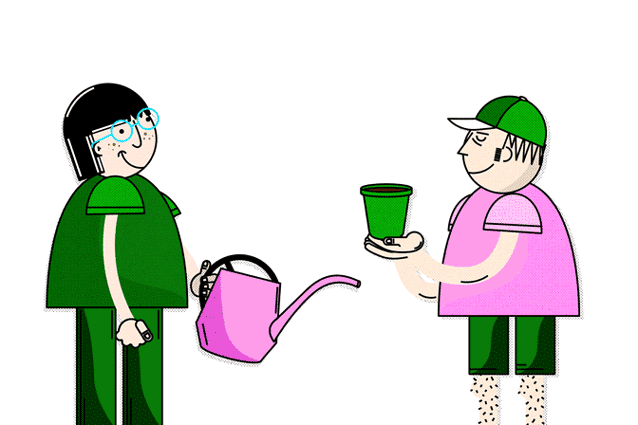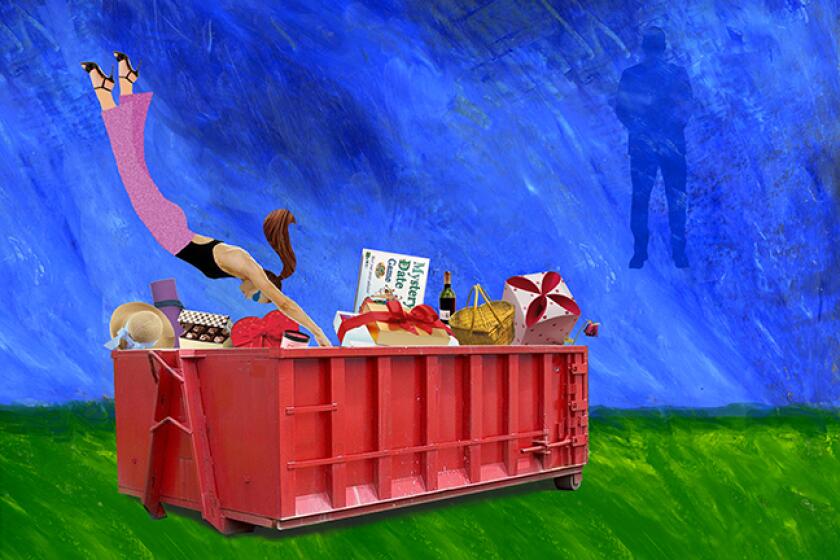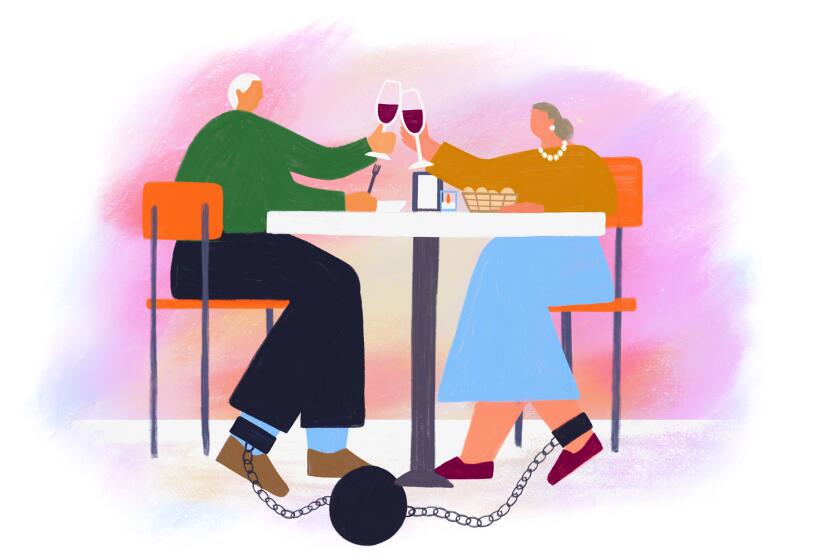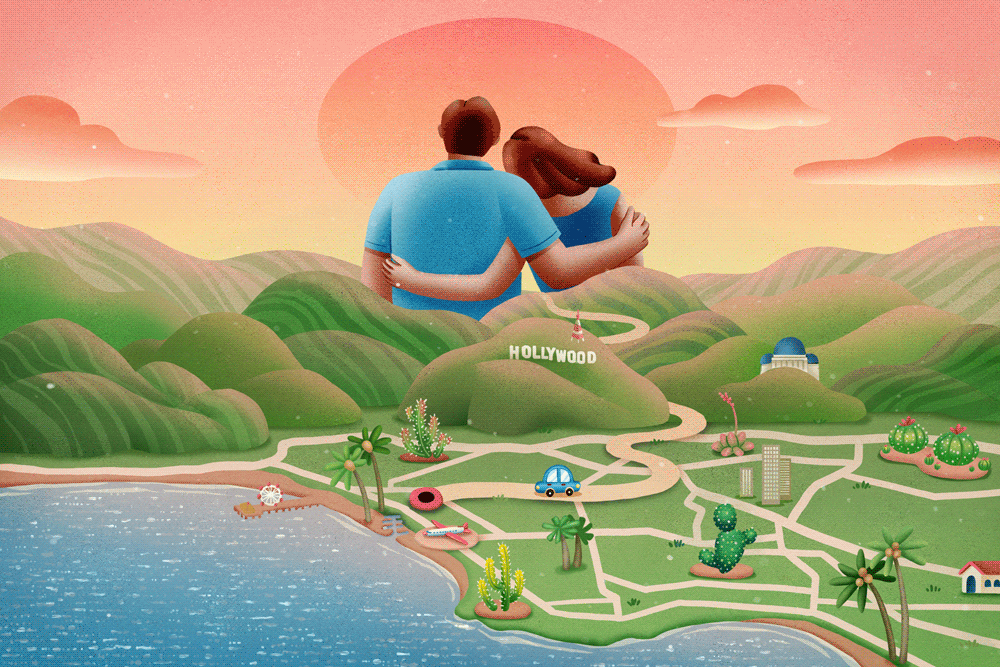L.A. Affairs: What if my final words to my husband were ‘Call me?’

- Share via
The first time I dropped off my husband at the UCLA emergency room in the spring of 2020, I wasn’t seriously concerned. Although he looked worried and said, “I think I’m having a heart attack,” I waved it off as a panic attack.
I’d experienced a series of them after I had COVID that March, waking up at night clutching my chest and gasping for breath. When I pulled away from the ER, I gave Carl a kiss and said, “Call me when you want me to pick you up.”
The minute he got out of the car, I wished I had said more — anything more. What if he really was having a heart attack and my final words to him were, “Call me?”
I’ve done my share of dumpster diving. The dating landscape had changed from when I was in my 20s. Gone were the days of bar hopping and men falling at my feet.
Several excruciating hours and many tests later, the ER doctor pronounced him fine, and I drove him home. But as the shutdown dragged on, it was clear something wasn’t right; horrible coughing fits and fatigue sent him to bed by 8 p.m. every night, and pain in one arm made it uncomfortable to work at his computer.
I felt terrible guilt as I was the one who unknowingly brought the pandemic into our home, especially because this wasn’t my husband’s first medical scare in the 20 years we’d been together.
I learned about Carl’s autoimmune disease on our first date. We were on a beautiful ocean-view hike when he pulled six sugar cubes from his pocket. I watched as he carefully unwrapped the tin foil and popped them in his mouth.
“You know I’m diabetic, right?” he asked.
How had I missed the medical alert bracelet on his left wrist and not noticed how pale he’d become? Diabetic? That sounded serious, requiring a level of maturity not found in someone like me.
And when I say me, I mean me, me, me, me because at that point in my life, everything was about me.
Months before that first date, I ended a serious long-distance relationship because it was too hard. And I had just nixed a new guy who found out a one-night stand was having his baby. I just wanted someone to go to dinner with and be my plus-one at weddings. Dating someone with a chronic illness seemed too hard.
Instead of following my instincts to run away, I went on a second date and a third with Carl. I couldn’t help but fall in love with this adorable man. He was smart, responsible and kind. He could fix a car and do a myriad home-improvement projects.
More than once our kids have asked, ‘Why didn’t you two get divorced?’ As my husband and I approached our 50th anniversary, I thought about the high and lows of our marriage as well as fantasized about other types of togetherness.
Once we became serious as a couple, though, he became seriously ill, going from fit and sun-kissed to skinny, pale and severely anemic.
Doctor after doctor was mystified. Was he internally bleeding? Did he have Crohn’s disease? Was it cancer? It seemed like our worst fear was realized when one called and told him, “We think you have cancer. We just can’t find it.”
Thankfully, an endoscopy revealed it was only celiac disease, an autoimmune disorder that is more commonly diagnosed now.
To get better, he needed to eliminate gluten — wheat, barley and rye — from his diet so he would be able to absorb food again, and his Type 1 diabetes would be more manageable.
I began researching and quickly became an expert on everything gluten-free. This was before you could buy gluten-free cookies at Target and order gluten-free pizza from Domino’s.
At restaurants, I interrogated waiters about the dishes Carl ordered, and when we went to dinner at a friend’s house, I rolled up with a gluten-free dish to ensure he’d have something to eat. At our wedding, drunk off the bottle of Champagne I’d been carrying around since saying “I do,” I stopped the manager to make sure my husband’s dinner was gluten-free.
My newfound caretaker instincts came in handy when I had my two boys, born 18 months apart. I was on bedrest with both, hospitalized with one, and later spent countless hours in the ER for stitches and random medical issues.
All of that time around hospitals didn’t prepare me for the second time I dropped Carl at the emergency room.
He was the good match except for one thing: He lived outside my acceptable mileage range. To me, the Valley was a land of trailer parks, billboards and bad takeout.
A month or so after that first ER trip, his chest pains were back, and he couldn’t breathe. I drove him to get a CT scan, and as we pulled out of the UCLA parking lot, his phone rang.
“Turn around and go straight to the ER,” his doctor said. There was fluid around his heart.
“Can he go home first and say goodbye to the kids?” I asked, wincing at my horrible choice of words. We both started to cry. At that point in the pandemic, going to the hospital with COVID-related illness was a one-way trip.
Carl packed a bag and hugged our kids. Then I took him to the ER. This time, I made sure to say everything I should have said before: I loved him more than anything, our boys were kind young men because of his example, and we would be OK no matter what. He was admitted and, because of COVID protocols, I couldn’t stay. So, I went home.
Carl spent weeks in and out of the hospital and, after a year with long COVID, finally improved with the first dose of the vaccine. We had many sleepless nights and stress-filled days in between, and as all of this was unfolding, my father died in a nursing home, and my mother came to live with us.
Before Carl came into my life, I didn’t think I would get married, have kids or live in one place for very long. I never imagined I would be charged with taking care of so many people. Or that I would have so much love in my heart that I would actually want to. For years, love was about how I felt in the moment and what it could give me. Now I know that love is about what I can give to other people.
The author is a freelance writer and contributing editor to Picturing Mexican America, a project that works to uncover the whitewashed history of Mexican Los Angeles. You can find her on Twitter and Instagram: @yvonneinla.
L.A. Affairs chronicles the search for romantic love in all its glorious expressions in the L.A. area, and we want to hear your true story. We pay $300 for a published essay. Email [email protected]. You can find submission guidelines here. You can find past columns here.
More to Read
Sign up for The Wild
We’ll help you find the best places to hike, bike and run, as well as the perfect silent spots for meditation and yoga.
You may occasionally receive promotional content from the Los Angeles Times.









